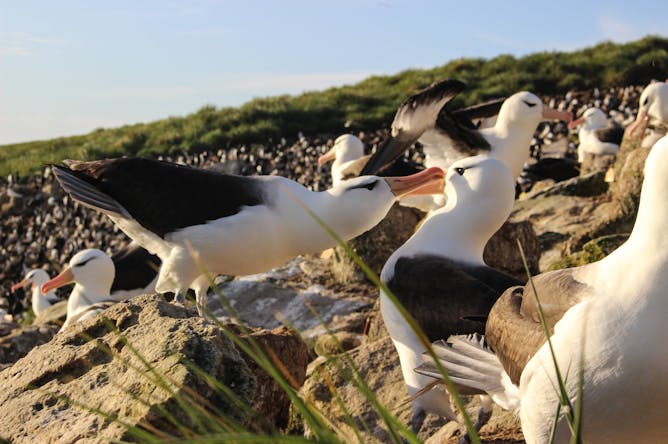|
|
|
|
Relationships end for myriad reasons – but climate change isn’t usually one of them. For black-browed albatrosses, however, rising ocean temperatures are driving a divorce boom, raising questions about how many other species’ lives are being unexpectedly disrupted by global warming.
Researchers found that as the seas warmed around the birds’ Falkland Islands habitats, monogamous albatross couples – who often stay together throughout their 70-year lifespans – are more likely to split up and find new partners. It seems as if the birds are blaming each other for the consequences of warmer waters, including longer journeys to find food and less free time for taking care of chicks. Even if albatrosses couple up again, they could be less
successful at raising chicks with their new partners, possibly threatening albatross populations over time.
Elsewhere, we’ve learnt that plankton and mountains, although at opposite ends of a size chart, share a surprising link. Two billion years ago, dying plankton populations were compressed into graphite at the bottom of the sea, providing the lubrication necessary to build mountain ranges on land. And, in pandemic news, a series of surveys gives us a better idea of what our ‘new normal’ might look like.
If you enjoy reading our stories, please consider making a donation, however small, to The Conversation. Every contribution helps us keep delivering fascinating stories from academic experts.
Donate now
|

|
Imogen Malpas
Commissioning Editor, Environment + Energy
|
|

Changing environmental conditions can put stress on coupled-up animals.
Natasha Gillies
Natasha Gillies, University of Liverpool
Warming seas are harming albatross couples’ resilience, leading to higher rates of separation in the seabirds.
|

The Himalayas.
Liudmila Kotvictchkaia/Shutterstock
John Parnell, University of Aberdeen
Mountains can’t be created without lubricant, and 2 billion years ago that lubricant was graphite produced by the carbon broken down from layers of dead plankton on the ocean floor.
|

Jacob Lund/Shutterstock
Danny Dorling, University of Oxford
Surveying by the Office for National Statistics shows Brits are increasingly pessimistic about things returning to how they were before.
|
Politics + Society
|
-
Nando Sigona, University of Birmingham; Michaela Benson, Lancaster University
The British government is making specific choices about the way it presents data on Channel crossings.
-
Winifred Agnew-Pauley, Anglia Ruskin University; Amal Ali, London School of Economics and Political Science; Bisola Akintoye, University of Kent
In the past year, black people were seven times more likely to be stopped and searched than white people.
-
Hayleigh Bosher, Brunel University London
How the UK Court of Appeal reached its decision.
-
Colin Alexander, Nottingham Trent University
Tensions are high across the Taiwan Strait. But what are the origins of the relationship between China and Taiwan?
|
|
Health + Medicine
|
-
Adam Taylor, Griffith University
We won’t know whether Omicron evades COVID vaccines for another few weeks. Here’s why.
-
Gemma Ware, The Conversation; Daniel Merino, The Conversation
Listen to experts discuss the business practices of pharmaceutical companies in The Conversation Weekly podcast.
-
Stephen John, University of Cambridge
Health economists have tools for weighing up the benefits and costs of medical interventions. And they aren’t perfect.
|
|
Environment + Energy
|
-
Dan Chester, Lancaster University
Workers, not objects, make up most of the capital at risk from climate change.
-
Piers Forster, University of Leeds
Strengthen commitments to reduce emissions by 2030, redouble efforts to raise climate finance and junk fossil fuel subsidies.
|
|
Business + Economy
|
-
Mark Middling, Northumbria University, Newcastle
The fan-led review into the English leagues could be a game changer.
-
Niccolò Pisani, International Institute for Management Development (IMD)
Olaf Scholz faces the unfavourable task of uniting a coalition of three parties with very different agendas.
|
|
Arts + Culture
|
-
Julian Lawrence, Teesside University
Cartoon character Dennis the Menace has had more influence on British society than you might think.
-
Annebella Pollen, University of Brighton
A century ago, early British nudists had to fight for the right to publish naked photos – the similarities with social media today are striking.
|
|
Science + Technology
|
-
Coel Hellier, Keele University
Most of what we know about planets outside our Solar System relates to gas-giant planets. A new study has identified and characterised a smaller exoplanet.
|
|
| |
Featured events
|

|
— Online, Birmingham, Warwickshire, B15 2TT, United Kingdom of Great Britain and Northern Ireland — University of Birmingham
|

|
— Thomas Paine Study Centre Lecture Theatre, University of East Anglia, Norwich , Norfolk, NR4 7TJ , United Kingdom of Great Britain and Northern Ireland — University of East Anglia
|

|
— Egham Hill, Egham, Surrey, TW20 0EX, United Kingdom of Great Britain and Northern Ireland — Royal Holloway University of London
|

|
— Online, Zoom, Cardiff [Caerdydd GB-CRD], CF10 3BA, United Kingdom of Great Britain and Northern Ireland — Cardiff University
|
|
|
|
| |
| |
| |
| |
| |
|
|
|
|
|
|
|